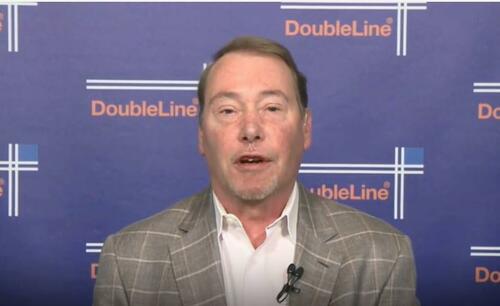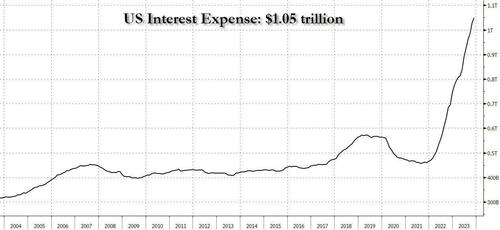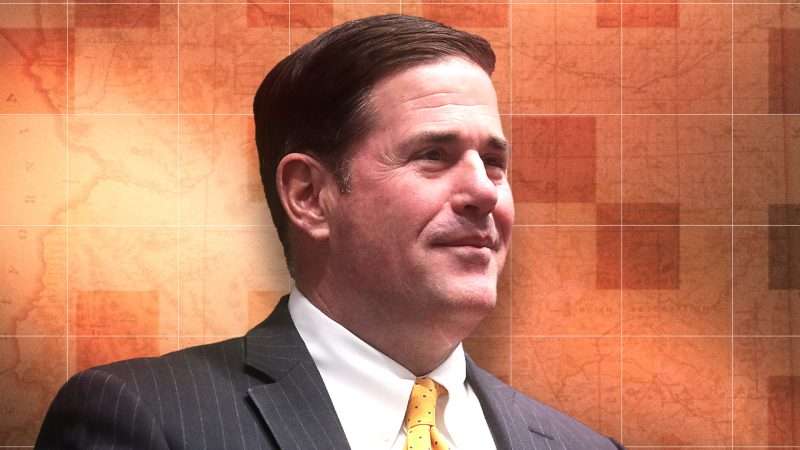During his two terms as governor of Arizona, Doug Ducey managed to pass a flat income tax with a rate of 2.5 percent, reform public sector pensions, universalize important school choice measures, reform occupational licensing rules, turn a budget deficit into a surplus, and substantially shrink the size of the government workforce. He also built a makeshift border wall out of shipping crates, pushed back on marijuana legalization, and was accused of doing both too much and too little by his constituents during COVID. Today, he runs Citizens for Free Enterprise.
In December, he received the Reason Foundation’s Savas Award for Privatization, which is given annually to someone who is advancing innovative ways to improve the provision and quality of public services by engaging the private sector. The former governor and Reason‘s Katherine Mangu-Ward sat down to talk about his worries about the future of the Republican Party, his commitment to fusionism, and why Arizona politicians are so weird.
Watch the full video here and find a condensed transcript below.
Katherine Mangu-Ward: What is it about Arizona that seems to just generate a kind of heterodox or unorthodox politician?
Doug Ducey: I don’t know. I think it’s a good question. I think maybe the fact that we’re the youngest state in the lower 48, that we’re a place where so many people came to live. So few people that are there today, were actually born there. So people make that decision. And then I think there’s something about the West and the spirit of Barry Goldwater, where it brings an independent-mindedness to it.
Mangu-Ward: Arizona has been red of late, but it’s trending blue. What do you attribute that to?
Ducey: Candidates matter. I would actually push back pretty hard. I was able to win in 2014 with the wind at my back and win by a larger margin in 2018 with the wind in my face in what was really a tough year for conservatives and Republicans around the country. And I was also able to capture 44 percent of the Hispanic vote against an opponent named David Garcia.
So if you have the right candidate, who’s talking about common sense kitchen table issues, and actually persuading the electorate, I think the state is still a center-right state. If you have somebody that wants to come and relitigate 2020 and only speak to the base, that’s a losing message.
Mangu-Ward: You campaigned in your first campaign on bringing taxes in Arizona as close as possible to zero, and you got to a 2.5 percent flat tax in the end. How did you do that?
Ducey: Persistence, persistence, persistence. It was our goal. Every year we lowered or simplified taxes and we actually had the left overreach and came into Arizona and I think deceived the voters with an initiative saying, “We can put 1 billion dollars additional into K-12 education and it won’t cost you any money, only the rich people.” And they took our 4.5 percent tax at the highest progressive level to 8. Now, 8 percent in Arizona would have been a cancer that would have metastasized over decades. That’s Bernie Sanders’ Vermont, Washington, D.C., or New York state. But it was popular. We worked hard to beat it. It was polling at about 65-35. We were able to drive it down to 51 percent on election day.
But when I was a young boy, there was a show on Saturday morning, Wild World of Sports, and they would talk about the thrill of victory and the agony of defeat. We suffered about 18 months of the agony of defeat while we challenged the initiative in court and eventually got to our Supreme Court. And then we reformed taxes in the legislature in the interim. The law, the initiative, was struck down and we had reduced taxes along the way. So had we been successful on election day, taxes in Arizona today would be 4.5 percent. But because we had a bad result, we persisted in the legislature and we had a Supreme Court that was not going to let out-of-state interest deceive the voter. Today, we have the lowest flat tax in the nation. So I would say a combination of good planning, good timing, and good luck.
Mangu-Ward: Is this something that other states can duplicate? I mean, this sounds like a lot of things coming together just right.
Ducey: Well, I believe so. I mean, I think if you make a pledge to your constituents that you’re going to simplify taxes every year and you win on that, then you have the permission to do that. If you can grow your economy, you have surplus funds. So it allows you to basically buy down your tax rate. And I’m a huge fan of the flat tax. I want us to be fair and equitable. And I think a flat tax makes a lot of sense. And it’s also very hard for the left to change because people understand it. Massachusetts is not known for being a low-tax state, but they do have a 5 percent flat income tax and they’ve not been able to change that or raise it. And today in Arizona, like I said, we’re at 2.5 percent. But if you get your economy growing and that’s my background, Katherine, I came from the private sector at Cold Stone Creamery, the ice cream company was my business. And I ran on a platform of kickstarting the economy. Now I want to shrink a government and grow the economy. I was looking at places like Texas and asking, why are they so successful in comparison to other states? And I was trained coming out of University of Procter and Gamble [PG]. PG is a big fan of best practices of something called “search and re-apply.” If you see another good idea anywhere in the world, you bring it back to headquarters with attribution.
In politics, I found people find good ideas all over the country and bring them back to their state, often without attribution. But Texas was the model. [Former Texas Gov.] Rick Perry and governors before him had turned an oil and gas state into a cosmopolitan place with international businesses that did business around the world. I saw no reason at all why Arizona couldn’t occupy that space. And I also was aware of the bad decisions that California was making. So I thought we were perfectly positioned and I wanted to be the chief salesperson and spokesperson to do that.
When I came into office, we had a billion-dollar deficit that first year. I think the first tax reform that we were able to pass was to make certain that you weren’t indexed out with inflation. And that was the start. We got the budget under control. The economy began to grow and we were able to ratchet that tax code down.
Mangu-Ward: I think sometimes, particularly in the modern GOP, you get a lot of emphasis on tax cutting and a lot less on the reduction of spending or balancing the budget. Do you think that issue is getting worse? Do you think that there’s a way to reconnect to those two ideas in American political rhetoric or in voters’ minds?
Ducey: Well, Katherine, I think you live here in Washington, D.C., and that’s what you are responding to as to how the Republicans in this town behave. You see the Democrats tax and spend. You see the Republicans in Washington, D.C. cut taxes and borrow. Governors don’t get to print money and there’s no appetite to borrow money except in the worst of a crisis. So you really do have to find a way to shrink your government.
I’m proud of the growth and attractiveness of Arizona. I think we have 400,000 additional people in Arizona versus the day that I came into office. But our state government is smaller. We were actually able to shrink the footprint of our state government, the number of people inside the state government, the number of buildings, and real estate holdings of the state government.
If you look at governors around the country who take this winning game plan and execute it, there’s a model that could be used in Washington, D.C. But here no one really seems to want to persuade on why we need to tighten the belt. I did take a hit that first year to balance the budget. There is no constitutional obligation to balance the budget. I just came from the private sector and I had lived through several downturns before, and I knew each time I navigated through a downturn as a CEO, I wished I would have acted faster with more of a sense of urgency and rightsizing the business. So I didn’t want to lose those lessons. And the largest responsibility I had in my life to date at age 50. So I said to the legislators who said, “We don’t really have to balance the budget. Nothing’s going to happen” that I wanted them to blame me for it, that I ran on it, I wanted to do it. I thought it was possible and the economy was going to get better and we could begin to invest again next year. And if the economy didn’t get better, we’d be happy we acted today because we wouldn’t be exaggerating problems for tomorrow.
Mangu-Ward: What was the cut or elimination or reorganization that you enjoyed the most during that period?
Ducey: I had a lot of people from the business community that helped me become governor, but none of them wanted to come work with me in government, so I had to find the best people in these agencies, the best people from around the country, to come work inside these agencies. And in my first month, you have the inauguration, “state of the state,” you present the budget, and in 2015, we were hosting the Super Bowl. So I was meeting with each of these agency heads and basically asking the same questions I would have asked somebody who wanted a top-level position in Cold Stone. “Who are you?” “What do you do?” “And how do you know if you do it well?” And you really want to hear somebody tie something to a metric as to how they measure things inside their agency. We had a director at Weights and Measures who said, “Let me tell you what I’m going to do. I’m going to sting Uber and Lyft during the Super Bowl and shut them down.” Obviously, he wasn’t paying much attention to the campaign. I was able to ask my general counsel, “What’s my authority over these agency heads?” He said, “They work at the pleasure of the governor.” I was able to release this gentleman into the private sector in what would soon be a growing economy. But that was my way to capture the attention of the state government that I was serious about making real reforms.
We went through a strategic plan just like we would in business. I wanted every agency to know what the mission of that agency was, to have public metrics, and how they could advance it, to have transparency to taxpayer money, and then to memorialize what they had accomplished the past 90 days, and could accomplish in the next 90 days, and make adjustments. So it’s basically a Six Sigma-type thing that you can do. I want to see us have less government, but I’m not somebody on the right that thinks government is unnecessary. I think the government serves a purpose. And when the government is responsive and it’s not putting obstacles in people and small business owners’ way people flock to your state. Businesses grow and have great success. And then in this economic development competition that we have among the states, we were winning the majority of them, and in yesteryear, it was all Texas. I think you’d see today that Arizona’s leading on this. Places like Texas continue to do well. Utah is very good. Florida, Tennessee, are all states that are really growing and they’re following the same model.
Mangu-Ward: Where do you think immigration fits into the picture of attracting the best people and kind of opening up the state to free enterprise?
Ducey: I think people in Washington, D.C. confuse border security with immigration. They are separate and mutually exclusive issues. Border security is about law enforcement. It’s about national defense. It’s about public health. We had a pandemic over the last two years, the border in Arizona is wide open and unprotected under President Biden. It was in the same condition under President Obama and that’s not how the law works. This is illegal migration. So if we can secure and stabilize the border, which was happening in 2019 and 2020, we can talk about immigration. And I’m pro-legal immigration. And we need new immigrants from the service sector to software engineers.
My first visit as governor internationally was to Mexico City. My first international visit upon reelection was to Mexico City, and my last visit as a sitting governor was to Mexico City. They are our number one trading partner times four, we have an incredible relationship with them. But we weren’t open to people illegally migrating. Solve the border situation, which is very solvable. It was already done in 2019 and 2020. Then we can talk about immigration reform, but border security happens in Texas, New Mexico, Arizona, and California. Immigration reform happens down the street here in Congress.
Mangu-Ward: What was the state of play on school choice in Arizona when you came in and what did it look like you left?
Ducey: Arizona has always been very good on school choice and it’s something that I believe in. I stood on the shoulders of giants like Lisa Graham Keegan and Fife Symington. At the state level, we have 525 schools of choice in Arizona, charter schools. Your listeners will know those are our public schools with private management. If you take those schools, that’s the number one state in the nation for accomplishment on math, reading, and science. We did a lot to grow that model. We have systems like the Basis School System and Great Hearts, both founded in Arizona. Part of what animated my run for governor in 2014 was universal school choice. The Milton Friedman idea that he shared on Free to Choose in his book and his PBS series is something that took me all eight years of my governorship to accomplish. We actually were able to pass a limited [Empowerment Scholarship Account] program in 2017. We have an anomaly of our Constitution where if you get enough signatures, you can refer a law to the people, and ESAs were referred to the people in 2017. And it was crushed. It lost 65 to 35.
Mangu-Ward: And these are education savings accounts? So essentially vouchers.
Ducey: Milton Friedman also said in a crisis, people will look for the ideas that are lying around. And the crisis that came was COVID and parents were able to see what their kids were being taught or not taught and the level of rigor and expectation from the public schools. They also saw that the charter schools opened and the Catholic schools opened and many of the largest public districts chose to stay closed for nearly two years, even when the government was telling them to open. So we were able to pass universal educational savings accounts. This is for every child in the state of Arizona, [who are] able to take a large portion of their tax dollars and go wherever they would like to school, including homeschool, micro-school, or a new school. So I think we were able to move the bar to the highest rung. Nine other states have since followed with universal school choice. Texas and Tennessee are on the one-yard line.
It reminds me a bit of Roger Bannister, [who] was the first man to break the four-minute mile. People thought that that was physically impossible. From the marathon in Greece to the 1960s, no one man or woman had broken a four-minute mile. I think it was several months after Roger broke four minutes, somebody else broke four minutes. And it’s been broken over a thousand times since. I think that this universal school choice is the way to truly reform K-12 education, and I think in many ways renew our country. This one crosses party lines. It was actually the African American pastors and a lady that leads the Black Mothers Forums, who wasn’t very happy with the way that I handled the summer of 2020, who was my lead advocate on universal school choice. Now, one of them, a Republican, and we were able to pass this with no Democrat votes. I wanted those votes, but they were beholden to the teacher’s union in Arizona. In my final year, we had a one-seat majority in our house, a one-seat majority in our Senate. We had a confluence of circumstances that happened that we were able to get in the final days. And like I said, other states have since followed.
Mangu-Ward: You were governor during COVID, and I saw there were moves from the Arizonans for Liberty who wanted to recall you for doing too much. And also from Accountable Arizona who wanted to recall you for doing too little. Which of them was right?
Ducey: I made the best decisions I could for the state of Arizona. I didn’t want to play politics with COVID, and I didn’t want to compete with other governors. I was going to make the best decision in real time for what was needed in our state. I did it a lot differently than many of the other Western states. I prioritized lives, livelihoods, and individual liberties.
I came from the private sector. I was the owner of a small business. Those are the people that I know and I understand what they go through. There were a lot of calls from elected officials with guaranteed government paychecks, people that would not miss a paycheck or a salary, choosing to work from home. I wanted to keep our businesses open. I think the evidence of how Arizona came out of COVID in comparison to other states is where the proof lies and to how COVID was handled.
Mangu-Ward: Is there something you would have done differently, though, in retrospect?
Ducey: I imagine there is, but not in the real-time of what was happening. Because, of course, I’m somebody who thinks you surround yourself with experts. But I made the decisions, so the experts were not on top. I erred on the side of caution until I had enough evidence that we knew where the vulnerable people were. We had communicated to the vulnerable people. And then they live in a free country, and it’s up to them to make the decisions that they want. But to get kids back in school, to have our businesses open, and to allow people to make responsible decisions. It’s something I felt very passionate about advocating for.
Mangu-Ward: Let’s talk about the current state of the Republican Party at the national level, as well as in the States. You recently took a new gig at the Citizens for Free Enterprise. My perception is that the current Republican Party, to say nothing of the current Democratic Party, is not too friendly to free enterprise these days. What can we do about that?
Ducey: Well, again, I would separate what you’re seeing in Washington, D.C., and some of the big government Republicanism that’s happening here, versus what you see happening in many of our states. Yet, there are some folks out there that are bullying big businesses. I think if we’re going to be a majority party, if we’re going to win on our ideas. There’s a lot of freedoms we could talk about over the course of this discussion, from freedom of speech to freedom of religion, freedom of assembly—all rights that we’ve seen under assault in the last several years. But they’re all undergirded by economic freedom. And it’s what’s allowed us to be the mightiest military in the history of the world. It’s also allowed us to make a lot of really stupid spending decisions and overcome that. I do think that if you go into a college classroom today and you held up a sign that says socialism and capitalism, it’s about a 50-50 proposition, and that should scare every freedom-loving individual in the country to death. So I think we have some work to do, not only with our youth and college classrooms but also with our electorate.
Part of the reason Citizens for Free Enterprise exists is because it’s an evergreen issue. There’s going to be certain social and cultural issues that we fight about every two years, and these are worthwhile discussions. This is how we answer these questions. But it wasn’t that long ago that a blue state governor who became president was actually accused of being pretty good on the economy. Under President Obama, it became more of a class warfare between the haves and the have-nots, with, I think, an overemphasis on inequality while now looking at the government supplements to what we do to those in the most vulnerable positions.
So we want to advance the cause of free enterprise, and we’d also like to drain some of the partisanship out of it. But it should always be protected on the right. And through what we’re going to be doing, people that are going to be attacking it are going to feel consequences regardless of what party they’re in.
Mangu-Ward: It’s a pretty big project to convince Americans to feel better about capitalism or to like free trade or something like that. It’s Reason‘s project as well, in many senses. Where do you see the doors that are open for that?
Ducey: Well, I would come at it from a different angle. I think that Americans love small businesses and they love small businessmen and women and they love many of these entrepreneurs and local shop owners and their own cities, towns, and municipalities. And if you go to CitizensforFreeEnterprise.com, you’ll see many of their stories on our website. So part of it is, of course, the principles that you and I have read and understand and want to make certain are being communicated properly in our grade schools and our high schools and our colleges and happen at many places like a great arts academy in Arizona. Kids come out really understanding what makes the economy tick and how to live within your means and why this is not only a good personal habit. It’s also a responsible habit of a business or a government or an enterprise.
But I think when people can hear the story from the entrepreneur, whether it’s the local microbrewer or the guy who runs the four-wheel shop who retrofits pickups, it helps people understand why this is important. And we have so many stories of people that have had great success. The other thing that I think happened rather recently is we’ve separated the entrepreneur and the small business owner from the employee. Well, actually their interests are aligned. The more successful the company is or the city or town or municipality, the more opportunities are there for the employee. They may or may not want to cast their lot in the entrepreneurial world. They may just want to climb the economic ladder and be able to build personal financial security. And without that opportunity to build financial security, is there really freedom there? I mean, these are things that go hand in hand.
Mangu-Ward: Economic liberty requires more than just protecting small businesses. Right? What is there to do about this “we’ll tax the rich and solve all the problems” mentality?
Ducey: Well, one, the numbers don’t work. And you know that the math on that is never going to work. And that’s not unusual. I actually think that’s playing on some of the worst of human nature to build this envy in folks. There’s all kinds of social scientists that will show you that people actually feel better if somebody is doing worse while they’re doing better. And we’re not going to participate in any of that. We’re just going to educate and advocate around free enterprise and try to bring that voter into the fold so that they can make the decision on election day on who’s in support of it. And it’s regardless of party. I think you’d find more of that right now on the right, but as you mentioned, there are some folks here in this town and there are some folks in state capitals that are beating up on businesses. I think if we continue to do that or allow that to happen, we’re only sharpening the knife that the left will eventually use on us.
Mangu-Ward: Who are some folks either in D.C. or around the country that you think are doing good work right now?
Ducey: Well, I mentioned the states. Greg Abbott’s doing good work in Texas. Everybody’s seen what Ron DeSantis has done in Florida. Bill Lee and Bill Haslam before him in Tennessee. Pete Ricketts just came out of Nebraska and you’re lucky to have him in the United States Senate here. Hopefully, he can bring a little bit of the common sense of what governors have to deal with. Eric Holcomb in Indiana and Kim Reynolds are also people that are taking states that don’t have some of the sunbelt attractiveness but are attracting companies and have their citizens very happy with what they’re doing.
Mangu-Ward: Is attracting companies the right measure? I’m thinking here in D.C., we’re currently having a battle over where our stadium is going to be. And of course, with that comes a bunch of cronyism. Can you talk about how to make those distinctions?
Ducey: Well, I think a company would be different than a stadium. I was trained at Procter and Gamble that any business that is won on price will be lost on price. So all of the incentives that we had in Arizona were performance incentives and they were in statutes. We were not able to negotiate with that business owner. And listen, if it was all about the numbers and all that mattered was the bottom line on that decision, you would have states going to the absolute lowest cost place in which to do business, but no business owner or CEO moves to where they do not want to live. They also know that quality of life is going to attract their senior management team and their employees. That’s the mix that I believe we had right in Arizona. Not only low tax rate regulation, affordable, and reliable energy with excellent education, but we had a great quality of life. They could have confidence that their taxes were not going to be hiked and that they would be able to hire people from across the country and around the globe that would want to come live in these communities.
Mangu-Ward: What do you think about the rise of this kind of economic variant of national conservatism? To some extent, it’s a D.C. phenomenon and certainly a D.C. chattering classes phenomenon, but it’s manifesting in our politics for sure.
Ducey: Well, the right has always been a fusion. I think the right, especially from Barry Goldwater, and we like to say in Arizona that he never lost that election in 1964. It just took 16 years to count the votes. But that idea of what William F. Buckley and Goldwater and Ronald Reagan projected was what made the Republicans and the right a majority party. That not only had the fiscal conservatives and the tax hawks, but it had the social conservatives and the people that cared about Second Amendment rights and then Tea Party folks and evangelicals. And each time the party continued to grow.
I think you see this Washington, D.C. free-con versus NatCon discussion. One thing I wholeheartedly agree with the NatCons is countries have borders and those borders should be protected and ours is not on the southern border. And I think that’s lost on people of responsibility here, including the president and vice president, who have not been to the border or understand the situation that ranchers in these small towns are going through. But I think the fusion between the folks that want to talk about national identity and our borders and what you see on the freedom side of the equation is where we’ll land. I am much more of a free trader. And I do think that we were able to get some things right in the Trump-Pence administration in finally understanding what was happening in China.
I know from opening ice cream stores in both Beijing and Shanghai that they were able to play by different rules. No one had ever called them on it. There’s an immense amount of trade that happens between the two countries, and I think that both countries benefit. But I don’t think it’s unfair for us to expect that they behave by a certain set of rules if we’re going to continue to do that.
And the other opportunity I think COVID gave us was that we don’t want to be put in that position again with our supply chain. One thing I really liked about the [United States-Mexico-Canada Agreement], which was an improvement of [the North American Free Trade Agreement], my focus was first and foremost on Mexico as our top trading partner. Well, our number two trading partner was Canada. You can say that for pretty much all 50 governors. So if somebody is not going to open their business in Arizona, I’d prefer they open it in one of the other 49 states, if not one of the other 49 states. I prefer Mexico or Canada. That’s not only good for North American free trade. It’s also good for peace and prosperity. And in any pandemic or global crisis. This doesn’t mean we decouple from China, but it also doesn’t mean that we allow them to steal our intellectual property and to run roughshod over any way they would like to in which to do business. And we have a vote as well.
Mangu-Ward: People are going to feel closer to what they’re seeing with the Israeli-Palestinian conflict. People are going to feel closer to conflicts all around the world. How does that play out for U.S. involvement, either in terms of foreign policy or trade?
Ducey: Well, I am generalizing here, but I think that you and I have basically come of age in a magical American moment. I mean, in our lifetime we’ve had one bad day, and September 11th, and it changed a lot in this country. But we were one of two superpowers around the world and we were the only superpower in 1989. And smart people were able to write books where they claimed it was the end of history and freedom and democracy and free enterprise would spread around the globe. And then we had the shock and surprise of 9/11. Now, this is a return to real history. While I fear that we’ve projected weakness around the globe and these conflicts are what is more normal in the course of time.
I think us making responsible decisions at home, making sure we’re investing in our defense, are projecting strength so that we can achieve peace. And then we’re divided as a nation. There is an isolationist attraction right now. This is not new in this nation and it’s not new for the right or for the left. We weren’t eager to get into World War Two until the morning after December 7th, 1941. What we don’t want is that kind of shock to our system or to what’s happening around the globe. I do think, of course, Ukraine and Russia’s aggression is something we were all talking about until October 7th. And then we saw how fragile geopolitics are right now. So I think we’re having a real discussion. This is going to happen in an election year, and I’m going to be advocating that we project strength where necessary and make sure that we keep our alliances.
Mangu-Ward: You mentioned a few influences earlier, Barry Goldwater, Ronald Reagan, Bill Buckley. In this sort of American era that you just described, what were some of your influences that shaped your politics?
Ducey: Well, what [former Gov.] Mitch Daniels did in Indiana, I found very encouraging. I always look for a model of someone that I can study. And Mitch really talked and thought and wrote like a businessman. I’m from the Midwest. I grew up in Toledo, Ohio, and lived there till I was 18. And God bless the Big Ten. But Mitch didn’t inherit a state where a lot of people were dreaming of retiring. He did this in the traditional heartland. I thought in his book Keeping the Republic, where a lot of innovative entrepreneurial policy ideas. That really is the great thing about being a governor, most people wouldn’t know who a governor is in another state. COVID might have changed a little bit of that because I think you were able to see a real difference between red states and blue states and how we handled it. I didn’t realize how many of my peers on the left were closet authoritarians, but before that, we were all trying to solve problems. We might have solved them from a different point of view, but governors are very collegial.
I spoke about this in my last public speech before I left the governor’s office at the Reagan Library about a return to federalism. I simply think that our federal government here in D.C. tries to do too much, and it does most of it poorly. So why doesn’t it focus on a national defense and securing the border and reforming our finances to protect a social safety net for our elderly and most vulnerable, and then push everything else back to the states and let the states compete? Governors communicate or collaborate, but at the end of the day, we compete with each other. We want to show up at a Republican Governors Association meeting and talk about who’s lowered the taxes the most or who’s eliminated the most regulations. We know that Americans vote with their feet, and there will be a time—it may not be in Gavin Newsom’s or Andrew Cuomo’s or J.B. Pritzker’s time—but where these governors will be held accountable for the people that are fleeing their states to go to a better quality of life. I think we would have better policies if we were able to do that with no strings attached because I don’t know what happens when someone gets elected to Congress. They can be a good conservative in the state legislature and they come here and all of a sudden they think that you’re a middle manager in their federal corporation.
Mangu-Ward: When Mitch Daniels made a kind of earlier foray into national politics, he ended up drawing a lot of fire for saying something that’s always stuck with me, which is essentially “we don’t have time to do culture wars because our economic situation is so dire and our fiscal situation is so dire. We simply cannot get distracted by culture wars.” This was many, many years ago. Was he right?
Ducey: I think the reality of politics is that you have to meet the voters where they are. I have this same sense of concern around our finances and our debt. We’ve not paid a price for it, so to speak. And when we do, it will be devastating. So I think somehow you have to navigate the social issues and maybe part of the silver lining of an October 7th, if there can be any, is the exposure of what’s happening. So many of our universities and our elite institutions that we realize that so young people aren’t learning. Twenty percent of these young people don’t believe the Holocaust happened and they’ve divided the world into oppressors and victims. I think if there’s an issue right now, it’s the woke stuff that you’re seeing, for lack of a better way to put it, on the left, and then some of the discussion on the right that is much more top-down and driven from the newly elected king that will come to Washington, D.C. Those are realities. And it’s going to be up to leaders to present a better, more constitutional alternative.
This interview has been condensed and edited for style and clarity.
- Video Editor: Adam Czarnecki
- Video Editor: Justin Zuckerman
- Audio Production: Ian Keyser
The post Former Arizona Gov. Doug Ducey Loves Barry Goldwater and Milton Friedman appeared first on Reason.com.
from Latest https://ift.tt/BFS45jU
via IFTTT








